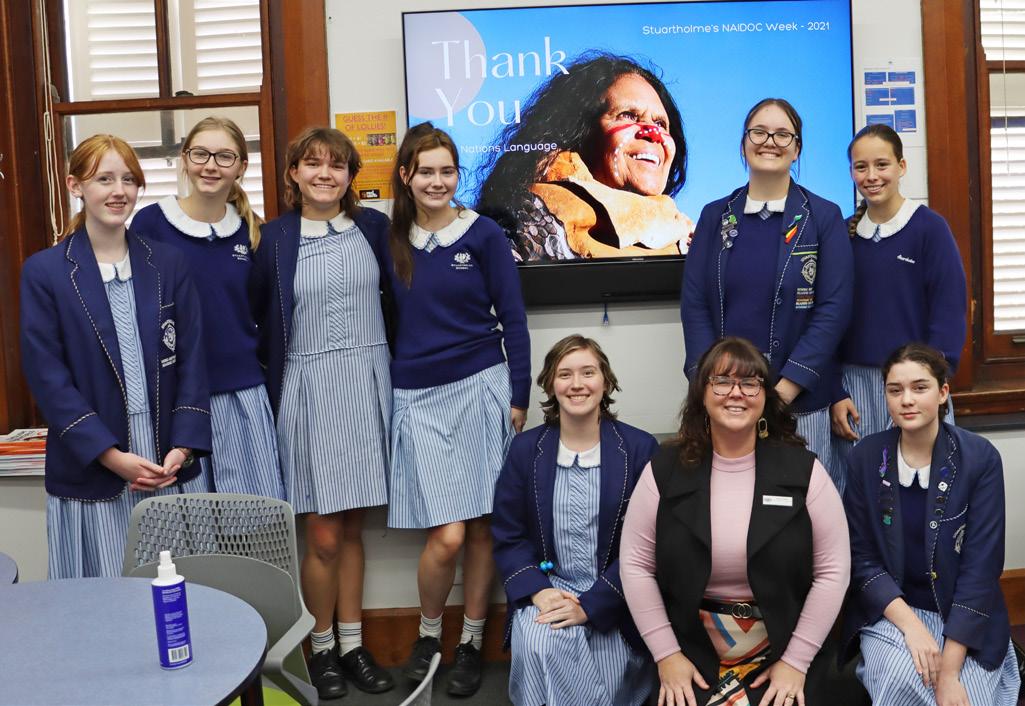
4 minute read
Lab Project
SUSTAINING A VIBRANT VILLAGE – THE STUARTHOLME SCHOOL
Lab Project
It is well established that optimising success for today’s school students is a three-way connect whereby staff, parents and students rally to deliver outstanding results. Policymakers call for effective education that resides in a partnership between families, parents, and the community (Government of South Australia, 2014). No one community member can take responsibility for the other when you are in the business of delivering the best outcomes for every child. An effective implementation framework is a critical success factor that accounts for stakeholders’ diverse needs within school communities (Catholic School Parents Australia, 2021). The old adage “it takes a village to raise a child” is well in play at Stuartholme School. As with many schools across the globe, COVID put downward pressure on this three-way partnership. In sustaining our vibrant, vivacious village, it was necessary to explore new frontiers to support parents. A creative solution was born in the genesis of the Stuartholme Lab Project, an essential plan in the schools’ learning and wellbeing program aimed at rebalancing the scales and building parent capacity. The driver behind the Lab Project was supported through the longitudinal data indicating the compelling benefits of parental engagement. Parental involvement can positively impact child’s achievement, irrespective of the influence of background factors such as race or socioeconomic status (Desforges and Abouchaar, 2003, p.28; Kaufman, 2021). When parents work as partners in their child’s learning, this can have long-lasting positive impacts, including engagement in learning; growth in academic buoyancy, enjoyment of learning; enhanced relationships; early intervention and challenging student expectations (Kaufman, 2021; Catholic School Parents Australia, 2021). Most importantly, the work of schools can only operate alongside what happens in the home and cannot ever replace the role, and responsibility parents have in supporting the achievement of educational excellence (Geelong Grammar School, 2020). Additionally, there is benefit in both teachers and parents “sharing the how” about what works well to achieve more strength in this domain (Presland, 2004). Stuartholme is leading the way in this regard with the “Lab Project”. Stuartholme enacted a robust framework for implementation underpinned by a range of guiding principles to enhance parent capacity. Influenced by the Dual Capacity-Building Framework for Family-School Partnerships (CSPA, 2021), implementation centred on the “4 C” areas to build and enhance the partnership’s capacity. These included Capabilities (skills and knowledge); Connections (networks); Cognition (beliefs, values); and Confidence (self-efficacy). It was integral this was present across learning experiences for parents, students and staff to address the strong correlation between teacher quality, parent engagement and student academic achievement (Pillay, 2020). Strategically, a staged approach was developed to harness the collective wisdom of the parents, students and staff to target input on areas of need. Through this collaborative process, it was apparent that the unique approach of parents mentoring and coaching other parents was a key factor in seeing parents drive their own learning and collectively build capacity through engaging and learning with each other.
Initial implementation involved a parent-led workshop facilitated on themes on which a panel of experienced parents provided insights and guiding direction. This was enacted through consultation with the Parents of Stuartholme forum to seek their input, support and buy-in. A critical success factor for the workshops was that parents facilitated these. Of note, the project accounted for the need to acknowledge parents enact a range of different styles of parenting. From conservative through to liberal viewpoints, it was integral that the model respected this and offered creative solutions for parents to customise for their circumstances.
Parent response to “The Lab Project” was overwhelmingly supportive. Feedback from the first facilitated workshop identified that parents were relieved to receive advice from other parents and took solace they were not alone in navigating these adolescent issues. In addition, they enjoyed the opportunity to receive advice on parenting from those who had been there before, and explore ways to adapt this to their own home.
The Lab Project has now been complemented with input from Positive Education Champions and International Experts; Dan Haesler, Power of Positive Psychology and Dr Ron Ritchhart, Harvard University, to facilitate parent learning on issues around Power of Positive Psychology and Cultures of Thinking within the classroom. Over 120 parents engaged in the first face to face and online learning with International Positive Education expert Dan Haesler to build skills in ensuring their child’s: positive emotions, engagement with learning, respectful relationships, purpose, and achievement as part of “Stuartholme The Lab Project”. Ultimately, this process has enabled the capacity building of staff, students, and parents to optimise each child’s success.
In looking to the future, Stuartholme aims to be proactive in supporting the wider educational sector, and the Lab has been extended to include a branch for educators. By providing opportunities for broader networking, The Lab for Educators supports each other to maximise learning and wellbeing success for all young people regardless of their school. This project is gaining momentum and will continue developing the educational sector’s capacity to learn from one another through formal and informal connections. Stuartholme is proud to have responded to the call of policymakers and to optimise success for today’s school students through an innovative three-way connect whereby staff together with the parents and students work together to deliver outstanding results. The continual focus on this three-way partnership is integral in ensuring that strategic priorities are enacted to align with the vision and ensure that all stakeholders can engage and participate in the pursuit of every child’s flourishing. Daniel Crump and Deb Lonsdale-Walker










